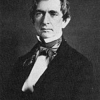William H. Seward

William H. Seward
William Henry Sewardwas United States Secretary of State from 1861 to 1869, and earlier served as Governor of New York and United States Senator. A determined opponent of the spread of slavery in the years leading up to the American Civil War, he was a dominant figure in the Republican Party in its formative years. Although regarded as the leading contender for the party's presidential nomination in 1860, he was defeated by Abraham Lincoln...
NationalityAmerican
ProfessionStatesman
Date of Birth16 May 1801
CountryUnited States of America
But the Constitution was made not only for southern and northern states, but for states neither northern nor southern, namely, the western states, their coming in being foreseen and provided for.
But you answer, that the Constitution recognizes property in slaves. It would be sufficient, then, to reply, that this constitutional recognition must be void, because it is repugnant to the law of nature and of nations.
I deem it established, then, that the Constitution does not recognize property in man, but leaves that question, as between the states, to the law of nature and of nations.
The United States are a political state, or organized society, whose end is government, for the security, welfare, and happiness of all who live under its protection.
Therefore, states are equal in natural rights.
Revolutions never go backward.
The constitution regulates our stewardship; the constitution devotes the domain to union, to justice, to defense, to welfare, and to liberty. But there is a higher law than the constitution, which regulates our authority over the domain, and devotes it to the same noble purposes. The territory is a part, no inconsiderable part, of the common heritage of mankind, bestowed upon them by the Creator of the universe. We are his stewards, and must so discharge our trust as to secure in the highest attainable degree their happiness.
A party with one idea; but that is a noble idea ... the idea of equality - the equality of all men before human tribunals and human laws.
The two systems slave and free-labor are incompatible. They have never permanently existed together in one country, and they never can.